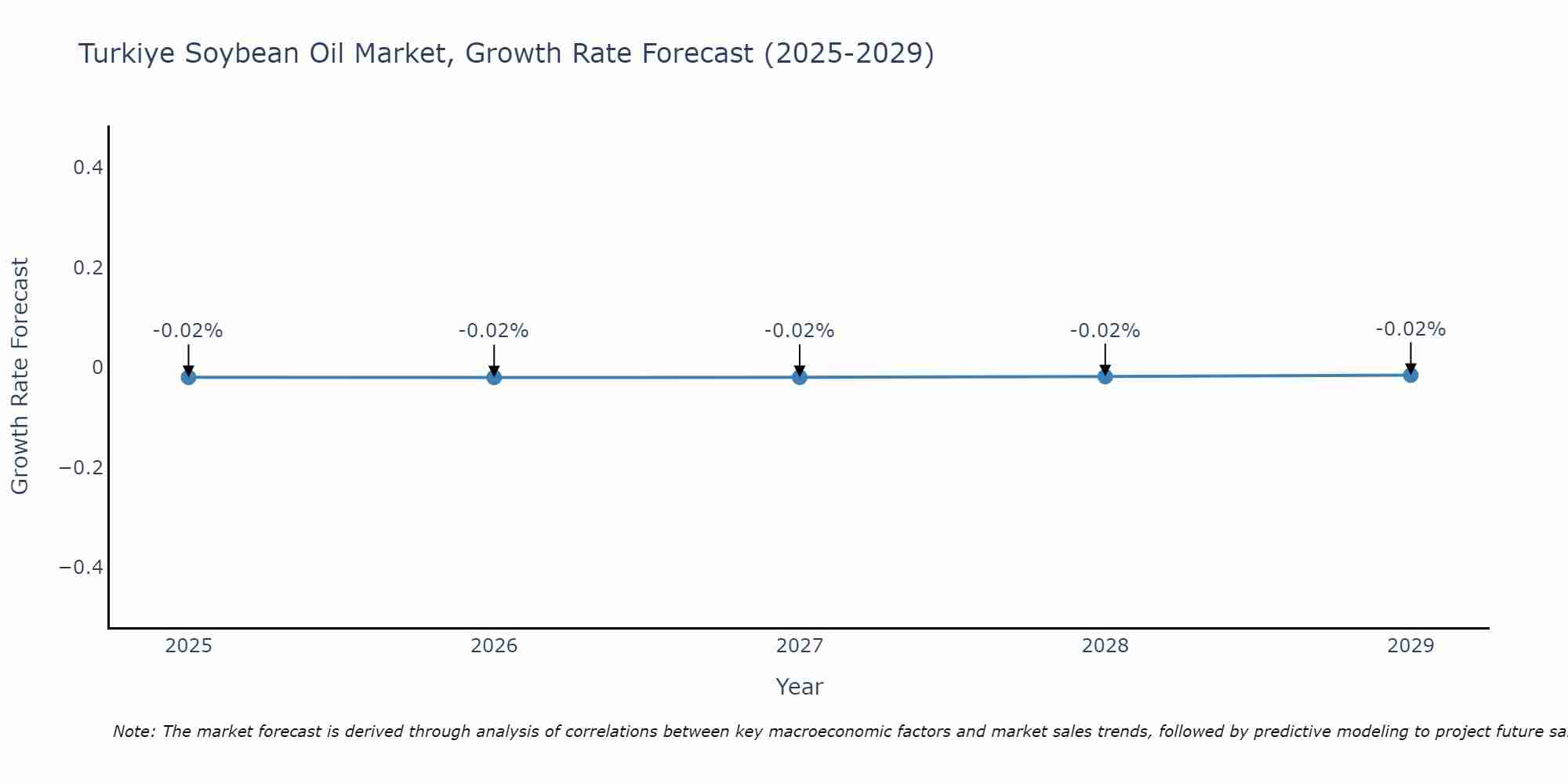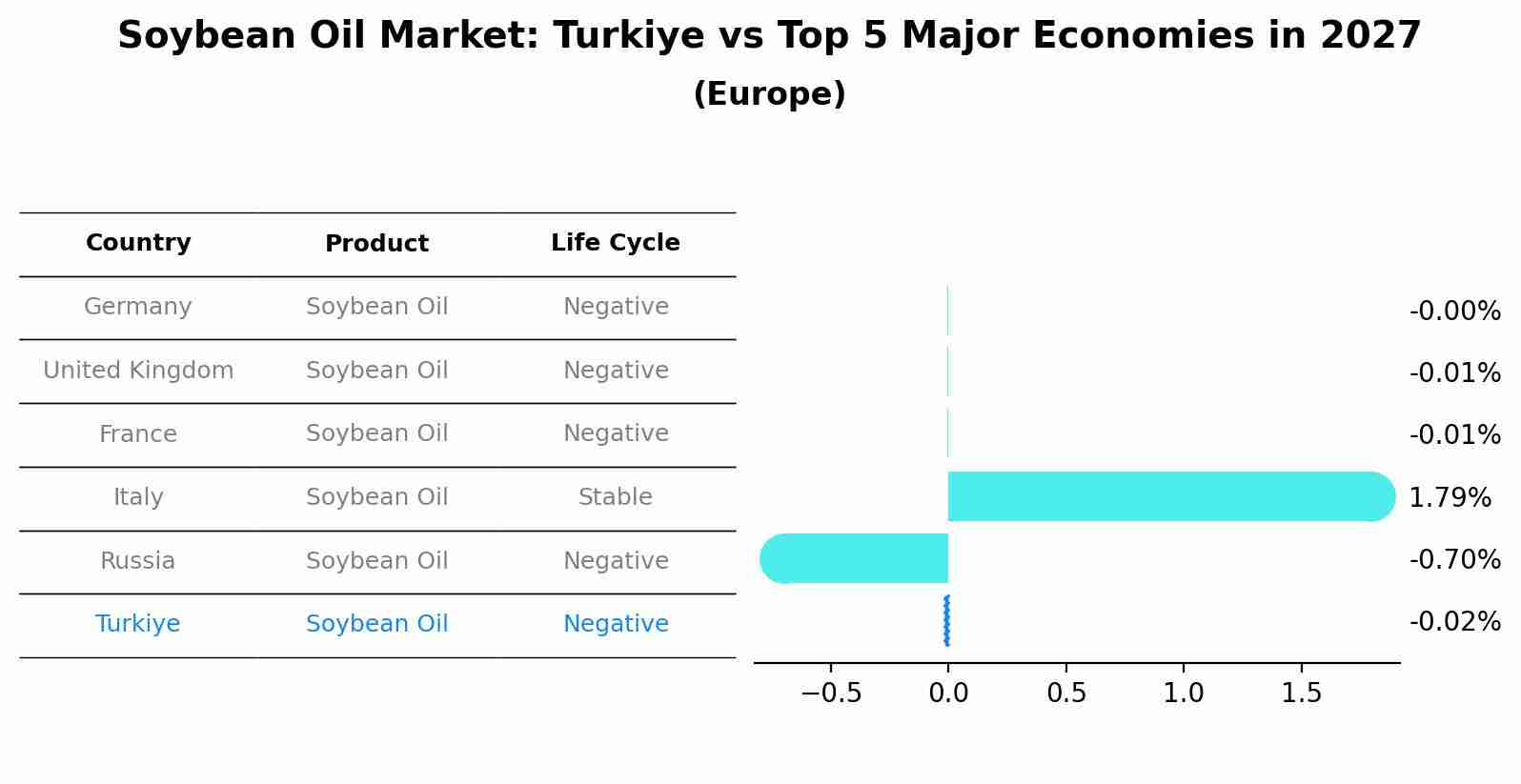Turkey Soybean Oil Market Outlook | Growth, Companies, Industry, Share, Analysis, Value, Size, Trends, COVID-19 IMPACT, Forecast & Revenue
| Product Code: ETC385058 | Publication Date: Aug 2022 | Updated Date: Jul 2025 | Product Type: Market Research Report | |
| Publisher: 6Wresearch | Author: Summon Dutta | No. of Pages: 75 | No. of Figures: 35 | No. of Tables: 20 |
Turkiye Soybean Oil Market Size Growth Rate
The Turkiye Soybean Oil Market is projected to witness mixed growth rate patterns during 2025 to 2029. From -0.02% in 2025, the growth rate steadily ascends to -0.02% in 2029.

Soybean Oil Market: Turkiye vs Top 5 Major Economies in 2027 (Europe)
By 2027, the Soybean Oil market in Turkiye is anticipated to reach a growth rate of -0.02%, as part of an increasingly competitive Europe region, where Germany remains at the forefront, supported by United Kingdom, France, Italy and Russia, driving innovations and market adoption across sectors.

Turkey Soybean Oil Market Synopsis
The Turkey soybean oil market is experiencing growth due to increasing consumer awareness about the health benefits of soybean oil as a healthier alternative to other cooking oils. The market is driven by factors such as the rising trend of plant-based diets, growing demand for convenience foods, and the expanding food processing industry. Additionally, the versatility of soybean oil in various culinary applications, its affordability, and its high smoke point make it a popular choice among consumers and food manufacturers in Turkey. The market is highly competitive with key players focusing on product innovation, quality, and marketing strategies to gain a competitive edge. Overall, the Turkey soybean oil market is projected to continue its growth trajectory in the coming years, driven by changing consumer preferences and a growing food industry.
Turkey Soybean Oil Market Trends
Currently, the Turkey Soybean Oil Market is experiencing a growing demand for healthier cooking oils due to increasing health consciousness among consumers. Soybean oil, known for its high levels of unsaturated fats and omega-3 fatty acids, is gaining popularity as a healthier alternative to traditional cooking oils. The market is also witnessing a trend towards non-GMO and organic soybean oil products, driven by consumer preferences for natural and sustainable food options. Additionally, the rising awareness of the benefits of soybean oil in promoting heart health and reducing cholesterol levels is further fueling its demand in the market. Manufacturers are focusing on product innovation and marketing strategies to capitalize on these trends and cater to the evolving preferences of consumers in Turkey.
Turkey Soybean Oil Market Challenges
Some challenges faced in the Turkey Soybean Oil Market include increasing competition from other cooking oils like sunflower and olive oil, fluctuating global soybean prices impacting the cost of production, and consumer preferences shifting towards healthier alternatives. Additionally, limited domestic soybean production in Turkey results in a heavy reliance on imports, exposing the market to currency fluctuations and trade disruptions. Regulatory changes and import tariffs can also impact the market dynamics, making it challenging for players to forecast demand and plan investments effectively. Overall, the Turkey Soybean Oil Market is faced with a complex set of challenges that require a strategic approach to navigate and sustain growth in the industry.
Turkey Soybean Oil Market Investment Opportunities
Investment opportunities in the Turkey Soybean Oil Market include potential for growth due to increasing consumer demand for healthier cooking oils, as soybean oil is considered a healthier alternative to traditional oils. The market also offers opportunities for vertical integration by investing in soybean cultivation and processing facilities to gain more control over the supply chain. Additionally, advancements in technology and sustainability practices within the industry present opportunities for investments in innovative production methods and environmentally friendly practices. Furthermore, the export potential of Turkish soybean oil to neighboring countries provides avenues for expansion and increased market share. Overall, the Turkey Soybean Oil Market offers a range of investment opportunities for those looking to capitalize on the growing demand for healthier cooking oils and sustainable agricultural practices.
Jordan Agar Market Government Policies
The Turkish government has implemented various policies to support the soybean oil market in the country. These policies include import tariffs and restrictions on soybean oil to protect domestic production, subsidies for soybean farmers to promote cultivation, and quality control measures to ensure the safety and standards of soybean oil products. Additionally, the government has introduced initiatives to increase awareness about the health benefits of soybean oil consumption and encourage its use in the food processing industry. Overall, these policies aim to boost local production, improve product quality, and enhance the competitiveness of the Turkey soybean oil market both domestically and internationally.
Turkey Soybean Oil Market Future Outlook
The future outlook for the Turkey Soybean Oil Market appears promising, driven by increasing consumer awareness regarding the health benefits of soybean oil, its versatile culinary applications, and the growing trend towards healthy eating. The market is expected to witness steady growth due to rising disposable incomes, urbanization, and a shift towards healthier cooking oils. Additionally, the expanding food processing industry and the rising demand for soybean oil in various food products are anticipated to further boost market growth. However, challenges such as price volatility, competition from other vegetable oils, and fluctuations in raw material supply could impact market dynamics. Overall, with a favorable consumer perception of soybean oil`s nutritional value and versatile uses, the Turkey Soybean Oil Market is likely to experience sustained growth in the coming years.
Key Highlights of the Report:
- Turkey Soybean Oil Market Outlook
- Market Size of Turkey Soybean Oil Market, 2021
- Forecast of Turkey Soybean Oil Market, 2031
- Historical Data and Forecast of Turkey Soybean Oil Revenues & Volume for the Period 2018 - 2031
- Turkey Soybean Oil Market Trend Evolution
- Turkey Soybean Oil Market Drivers and Challenges
- Turkey Soybean Oil Price Trends
- Turkey Soybean Oil Porter's Five Forces
- Turkey Soybean Oil Industry Life Cycle
- Historical Data and Forecast of Turkey Soybean Oil Market Revenues & Volume By End-Use for the Period 2018 - 2031
- Historical Data and Forecast of Turkey Soybean Oil Market Revenues & Volume By Food for the Period 2018 - 2031
- Historical Data and Forecast of Turkey Soybean Oil Market Revenues & Volume By Feed for the Period 2018 - 2031
- Historical Data and Forecast of Turkey Soybean Oil Market Revenues & Volume By Industrial for the Period 2018 - 2031
- Turkey Soybean Oil Import Export Trade Statistics
- Market Opportunity Assessment By End-Use
- Turkey Soybean Oil Top Companies Market Share
- Turkey Soybean Oil Competitive Benchmarking By Technical and Operational Parameters
- Turkey Soybean Oil Company Profiles
- Turkey Soybean Oil Key Strategic Recommendations
Frequently Asked Questions About the Market Study (FAQs):
- Single User License$ 1,995
- Department License$ 2,400
- Site License$ 3,120
- Global License$ 3,795
Search
Thought Leadership and Analyst Meet
Our Clients
Related Reports
- South Africa Stationery Market (2025-2031) | Share, Size, Industry, Value, Growth, Revenue, Analysis, Trends, Segmentation & Outlook
- Afghanistan Rocking Chairs And Adirondack Chairs Market (2026-2032) | Size & Revenue, Competitive Landscape, Share, Segmentation, Industry, Value, Outlook, Analysis, Trends, Growth, Forecast, Companies
- Afghanistan Apparel Market (2026-2032) | Growth, Outlook, Industry, Segmentation, Forecast, Size, Companies, Trends, Value, Share, Analysis & Revenue
- Canada Oil and Gas Market (2026-2032) | Share, Segmentation, Value, Industry, Trends, Forecast, Analysis, Size & Revenue, Growth, Competitive Landscape, Outlook, Companies
- Germany Breakfast Food Market (2026-2032) | Industry, Share, Growth, Size, Companies, Value, Analysis, Revenue, Trends, Forecast & Outlook
- Australia Briquette Market (2025-2031) | Growth, Size, Revenue, Forecast, Analysis, Trends, Value, Share, Industry & Companies
- Vietnam System Integrator Market (2025-2031) | Size, Companies, Analysis, Industry, Value, Forecast, Growth, Trends, Revenue & Share
- ASEAN and Thailand Brain Health Supplements Market (2025-2031) | Strategy, Consumer Insights, Analysis, Investment Trends, Opportunities, Growth, Size, Share, Industry, Revenue, Segments, Value, Segmentation, Supply, Forecast, Restraints, Outlook, Competition, Drivers, Trends, Demand, Pricing Analysis, Competitive, Strategic Insights, Companies, Challenges
- ASEAN Bearings Market (2025-2031) | Strategy, Consumer Insights, Analysis, Investment Trends, Opportunities, Growth, Size, Share, Industry, Revenue, Segments, Value, Segmentation, Supply, Forecast, Restraints, Outlook, Competition, Drivers, Trends, Demand, Pricing Analysis, Competitive, Strategic Insights, Companies, Challenges
- Europe Flooring Market (2025-2031) | Outlook, Share, Industry, Trends, Forecast, Companies, Revenue, Size, Analysis, Growth & Value
Industry Events and Analyst Meet
Whitepaper
- Middle East & Africa Commercial Security Market Click here to view more.
- Middle East & Africa Fire Safety Systems & Equipment Market Click here to view more.
- GCC Drone Market Click here to view more.
- Middle East Lighting Fixture Market Click here to view more.
- GCC Physical & Perimeter Security Market Click here to view more.
6WResearch In News
- Doha a strategic location for EV manufacturing hub: IPA Qatar
- Demand for luxury TVs surging in the GCC, says Samsung
- Empowering Growth: The Thriving Journey of Bangladesh’s Cable Industry
- Demand for luxury TVs surging in the GCC, says Samsung
- Video call with a traditional healer? Once unthinkable, it’s now common in South Africa
- Intelligent Buildings To Smooth GCC’s Path To Net Zero


















